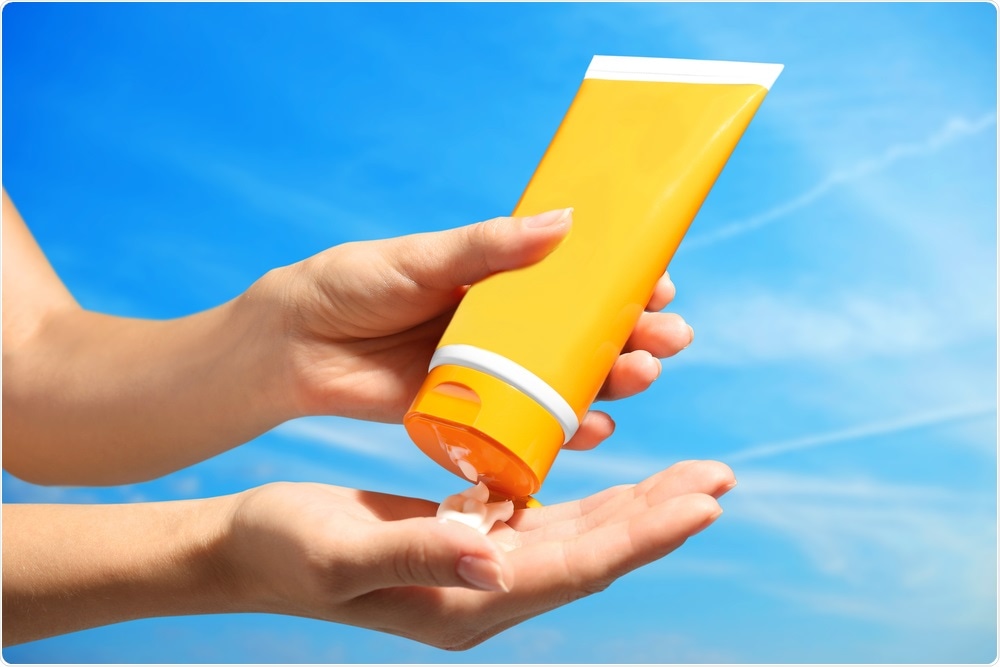A team of Canadian dermatologists have reviewed the latest evidence surrounding sunscreen use to conclude key points regarding its use, efficacy, safety, and areas still requiring further research. In a paper published this month in the Canadian Medical Association Journal, CMAJ, the researchers emphasize the necessity of all those above the age of 6 months to wear sunscreen to reduce their risk of developing skin cancer.

Sunscreen. Image Credit: Africa Studio/Shutterstock.com
The sun is the major source of ultraviolet radiation. Titanium dioxide and zinc oxide are particles added to sunscreen that are effective at blocking this radiation, giving sunscreen its protective properties. Given that as many as 80 to 90% of all cases of skin cancer are associated with long-term exposure to ultraviolet radiation, sunscreen, an effective measure to bock this radiation, has long been considered a vital preventative method against skin cancer.
In Canada, skin cancers are fairly prevalent, with 80,000 new cases arising each year. After reviewing the body of evidence surrounding sunscreen use, Dr. Megan Sander, a dermatologist and clinical lecturer at the Cumming School of Medicine, University of Calgary, Canada, and the paper’s first author explain that the data supports the efficacy of sunscreen at reducing a person’s risk of developing melanoma and non-melanoma skin cancer.
Here, we summarize the key findings of their study. First, the study found a wealth of evidence supporting the efficacy of sunscreen at protecting against both skin cancer and premature aging. The authors note that numerous randomized controlled trials have demonstrated that sunscreen use is associated with a reduced risk of developing squamous cell and melanoma skin cancers.
The study also points out the lack of data exploring the efficacy of sunscreen in non-white populations. Most of the studies the team reviewed had focussed on investigating the use of sunscreen in white populations, therefore, there is a gap in the knowledge regarding how sunscreen works across all populations. There may be different guidance required for non-white people vs white people.
The authors also concluded that sunscreen should not be used on babies less than 6 months old due to the possibility of absorption of the ingredients. After 6 months, they stress that sunscreen should be worn by all to prevent cancer and premature aging.
Sunscreen of at least sun protection factor (SPF) 30 or more was recommended, with sunscreen of higher SPF considered better at preventing sunburn. The authors also conclude that there is limited research investigating the effects of inhaling sunscreen particles given off by spray-on sunscreens, and for this reason, creams or lotions are recommended.
Additionally, the team found that there is a level of harm associated with sunscreen use. Evidence shows that sunscreen can induce skin reactions, such as contact dermatitis, which is especially prevalent with the use of chemical sunscreens. The team also highlight that there is limited data available on the effects of sunscreen absorption. More studies are needed to understand the potential health implications of long term sunscreen use.
Finally, the paper comments on the environmental impact of sunscreen use. There is a concern for the detrimental environmental impact of the chemical substances in sunscreens being introduced into the environment. Some recent studies have shown that sunscreen chemicals are detectable in water and fish and suggest that it may worsen coral reef bleaching.=
The results of the review indicate the importance of wearing sunscreen to protect from skin cancer and premature aging. However, sunscreen is not the only measure that should be taken to protect against UV exposure,
Sunscreen is only one part of a comprehensive photoprotection strategy. It is important to counsel patients regarding behaviors for avoiding ultraviolet radiation, including the use of wide-brimmed hats, eye protection (e.g., "wrap-around" sunglasses with ultraviolet radiation protection), and seeking shade when the ultraviolet index is above 3 (usually 11 am-3 pm, April to September in Canada),"
Journal reference:
- The efficacy and safety of sunscreen use for the prevention of skin cancer; Megan Sander, Michael Sander, Toni Burbidge, Jennifer Beecker. CMAJ Dec 2020, 192 (50) E1802-E1808; DOI: 10.1503/cmaj.201085